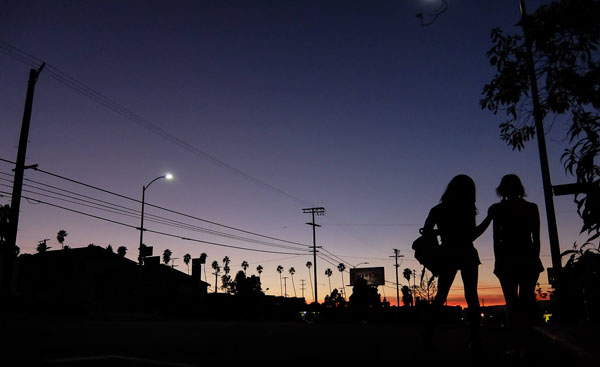“Even those who don’t count themselves among the transgender-prostitute-movie-shot-on-an-iPhone demographic will want to try Tangerine, an exuberantly raw and up-close portrait of one of Los Angeles’ more distinctive sex-trade subcultures,” begins Variety‘s Justin Chang. “Centered around two sharply drawn transgender women who find the resilience of their friendship tested and affirmed over the course of one busy Christmas Eve, writer-director Sean Baker’s sun-scorched, street-level snapshot is a work of rueful, matter-of-fact insight and unapologetically wild humor that draws a motley collection of funny, sad and desperate individuals into its protagonists’ orbit.”
Vadim Rizov for Filmmaker: “Tangerine unostentatiously celebrates fluidity, community, support and is generally quite hearteningly right-on, casual crystal meth use and all; it’s all the better for not trying to ennoble the characters. The film doesn’t feel ‘researched’ in any way: thanks to its (first-time performers) leading duo’s extensive insight into home turf, it has the intangible air of someone navigating terrain they understand viscerally rather than notes taken by a bewildered outsider and shoehorned into a plot.”
The setup, courtesy of Dan Schindel at Movie Mezzanine: “Sin-Dee (Kiki Kitana Rodriguez) has just been let go from a 28-day stint in jail, only to be informed by her best friend and fellow hooker Alexandra (Mya Taylor) that her boyfriend Chester (James Ransone) has been cheating on her. Furious, Sin-Dee tears ass to the sidewalks of Hollywood in search of her wayward beau, raising hell wherever she storms. A logline about transsexual prostitutes in the context of a film festival (especially Sundance) probably sparks the imagination towards lots of scenes with crying and/or harrowing abuse. Tangerine is … not that. From the opening moments, this is an aggressively comedic piece of work.”
Indiewire‘s Eric Kohn notes that “Baker has explored the lives of marginalized American characters in an ever-fascinating series of unorthodox projects. These have ranged from hustling lower class immigrants in Take Out and Prince of Broadway to the travails of a meandering porn actress in Starlet, for which Baker brought the same nuanced approach to an unlikely target. His latest movie Tangerine feels more in tune with the two earlier features, which is a very good thing.”
David Rooney in the Hollywood Reporter: “While the production comes from the Duplass Brothers stable, there’s a touch of Harmony Korine here, a dash of John Waters, and an echo of the resourcefulness of Jonathan Caouette, who made his dizzying 2003 memoir Tarnation with a little over $200, using iMovie software. Much attention will no doubt likewise be drawn to the microbudget Tangerine by the fact that it was shot on iPhones, using anamorphic adapters to produce a crisp, vigorously cinematic look. That gives it an aesthetic purity, if you will, that stands out in a field where so much indie filmmaking has gotten glossier and less technically adventurous.”
More from Nicholas Bell (Ioncinema, 4.5/5), Dan Mecca (Film Stage, A-), Brian Moylan (Guardian, 4/5), Nathaniel Rogers, Ben Umstead (Twitch) and Katie Walsh (Playlist, A-). At Ioncinema, Eric Lavallee talks with Baker and co-producer Chris Bergoch.
Updates, 1/31: For Manohla Dargis in the New York Times, “the most astonishing thing about this perfectly cast, beautifully directed movie is the tenderness with which he foregrounds marginalized characters who in other films are often used to add a little ‘color’ to other people’s lives.”
“It’s trashy, lurid, and hilariously profane—exploitation in the best, most cinematic sense—but without ever losing the thread of human ache that connects the handful of characters to each other,” writes Wesley Morris at Grantland.
“Let me confess immediately that the opening minutes of this movie had me itching to flee the theater, in order to escape what felt like a frontal assault,” writes Mike D’Angelo at the Dissolve. “Over time, though, these passionate, street-smart whirligigs grew on me, and by the end I was surprised by how fiercely protective of their fragile happiness I felt. The characters didn’t change at all—I changed…. In any case, the two irrepressible women, in all their violence and compassion, were all Tangerine needed. Did I like them? Not at first. Did I relate to them? Not in the least. Did that matter? Not one iota.”
At Verge, Casey Newton tells “the story behind the camera,” which “is as surprising as what’s in front of it.”
Ioncinema‘s Eric Lavallee talks with producers Karrie Cox and Marcus Cox.
Update, 2/23: Dan Mecca talks with Baker, Mya Taylor and James Ransone for the Film Stage.
Update, 7/25: “Watching the film,” writes Ben Sachs in the Chicago Reader, “I was reminded of documentaries I’d seen from the 1970s that were shot on the Sony Portapak, one of the first video cameras. Filmmakers at the time regarded this new, inexpensive technology as a means of documenting people who had been neglected by movies until then (radical political groups, immigrant communities, et cetera)—in a sense, they approached it as an ethnographic tool. Tangerine feels a bit like an ethnographic documentary in its focus on relatively isolated communities… Yet unlike much ethnographic filmmaking, Tangerine doesn’t create the impression of looking in on its subjects. The cameras are too close for that.”
Meantime, catch up with more notable reviews that’ve appeared since February at Critics Round Up.
The Sundance 2015 Index. For news and tips throughout the day every day, follow @KeyframeDaily. Get Keyframe Daily in your inbox by signing in at fandor.com/daily.





